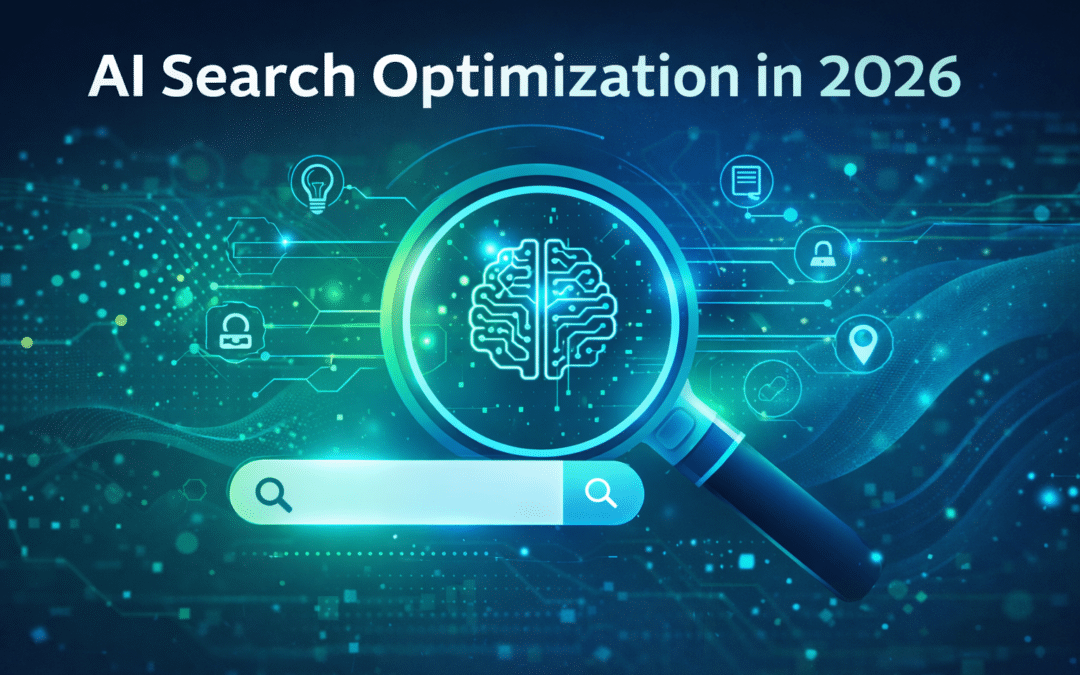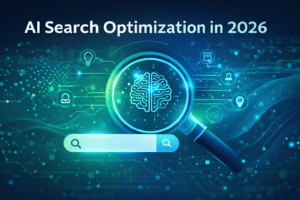
AI Search Optimization in 2026
AI Search Optimization in 2026: A Practical, Research-Driven Guide for Marketing Leaders
By Todd Boak, Partner, Harris and Ward
Last updated: January 6, 2026
Search is changing fast. Instead of showing ten blue links and letting users decide, AI-driven search experiences increasingly provide direct answers. For brands, that shift creates a new reality: visibility is not just about ranking. It is also about being retrieved, trusted, and referenced inside the answer.
This guide builds on current industry direction and practical field experience. If you want additional context on the broader landscape, see:
Search Engine Journal: State of AI Search
Table of contents
- What is AI search, and why it changes SEO
- Definition: AI Search Optimization (AISO)
- A framework you can use: Retrieve, Trust, Cite
- What changed from traditional SEO (and what did not)
- What AI systems look for when deciding what to reference
- Why healthcare and dental brands are uniquely impacted
- What this means for small businesses
- The 2026 playbook: What to do now
- How to measure success when clicks decline
- Common mistakes we see (and how to avoid them)
- FAQ: AI search optimization
- About the author
What is AI search, and why it changes SEO
AI search is an answer-first way of discovering information. Instead of presenting only a ranked list of pages, the system interprets a query, gathers information from multiple sources, and generates a response that attempts to satisfy intent immediately.
This is the key shift: the user’s decision-making step is compressed. Many users will still click through for deeper research, appointments, purchases, or verification. But a meaningful portion of queries are now resolved at the answer layer.
That matters because marketing teams have historically used rankings and organic traffic as their core scoreboard. In 2026, you still need strong SEO fundamentals, but you also need to win visibility inside AI-generated answers and summaries.
A simple way to explain it to an executive team
- Old model: Rank high, earn the click, then convert.
- New model: Earn inclusion in the answer, earn trust, then convert when users take action.
As Google has emphasized, the long-term winners tend to be brands that publish helpful, reliable content for people first: Google Search Central: Creating helpful, reliable, people-first content

Definition: AI Search Optimization (AISO)
AI Search Optimization (AISO) is the practice of structuring your content, technical foundation, and brand credibility signals so that
AI-driven search systems can retrieve your information, interpret it accurately, and reference your brand as a trusted source in generated answers.
AISO is not a replacement for SEO. It is the next layer on top of SEO. If your technical and content fundamentals are weak, AI systems will struggle to understand you, and users will struggle to trust you.
Where AISO fits in the marketing mix
- SEO builds discoverability and relevance.
- AISO increases the likelihood your content is selected and referenced in AI-generated answers.
- Brand creates familiarity and trust so users choose you when they are ready.
A framework you can use: Retrieve, Trust, Cite
When we advise clients, we use a simple framework because it is easy to operationalize across teams and locations.
1) Retrieve: Can the system find and understand your content?
Retrieval is eligibility. If AI systems cannot reliably access your content, or if your information is unclear, inconsistent, or poorly structured, you do not make the shortlist.
- Clean site architecture and internal linking
- Fast, stable pages (especially on mobile)
- Clear headings, scannable sections, and direct answers
- Accurate business and location signals for local intent
2) Trust: Does your brand show real experience, expertise, and authority?
Trust is the differentiator. For high-stakes topics (especially healthcare), AI systems and users both look for signals that the content comes from qualified sources and reflects real-world experience.
- Named authors and reviewers with credentials
- First-hand experience, clinical or operational details, and examples
- Consistent brand presence and reputation across the web
- Transparent policies (privacy, editorial standards, and disclosures)
3) Cite: Are you reference-worthy when the answer is generated?
“Cited” does not always mean a visible hyperlink. In many interfaces, the system may list sources, mention brands, or summarize without explicit links. The practical goal is the same: become the source used to form the answer.
- Content that is easy to quote or summarize accurately
- Definitions, checklists, step-by-step guidance
- Unique points of view backed by practical reasoning
- Topic coverage that matches real customer questions
Takeaway: Rankings matter, but in 2026 the larger win is being a trusted input to the answer.
What changed from traditional SEO (and what did not)
What did not change
- Technical SEO still matters. If your pages are slow, broken, or confusing, everything else is harder.
- Relevance still matters. Your content must match the intent behind the query.
- Authority still matters. Brands with strong reputations and consistent signals tend to win more often.
What changed
- Clicks are less guaranteed. More queries end at the answer layer.
- One “best answer” is often emphasized. AI experiences tend to compress choices.
- Content clarity is rewarded. Dense marketing copy underperforms against straightforward answers.
- Brand trust has more leverage. A strong footprint across the web supports inclusion in answers.
This is why I tell marketing leaders: treat your website less like a brochure and more like a reference library. In a world of AI answers, the reference library gets quoted.
What AI systems look for when deciding what to reference
While no platform publishes a complete recipe, in practice we see consistent patterns in what gets reused or referenced. If you want your article to be a source, you must make it easy for a machine to interpret and safe for a user to trust.
Content signals
- Direct answers: The first paragraph should explain the “what” without forcing a scroll.
- Clear definitions: Define key terms in plain language.
- Structured sections: Use headings that reflect real questions.
- Practical guidance: Lists, steps, checklists, and examples.
- Consistency: Avoid contradictions across pages and locations.
Experience and expertise signals
- Real authorship: Named author, relevant background, and a reason to trust.
- Review process: Especially in healthcare, note clinical review where appropriate.
- First-hand details: “Here is what we see in the field” beats generic advice.
- Responsible tone: Avoid absolute claims. Use patient-safe language where relevant.
Authority signals beyond your website
- Accurate business information: Consistent brand name, address, phone, and services.
- Reputation: Review volume and quality, plus response patterns over time.
- Mentions: Being referenced on credible sites and in credible contexts.
- Consistency at scale: Enterprise and multi-location brands win when they standardize quality.
Structured data can support clarity and eligibility. If your team needs a baseline reference, Google’s documentation is a good starting point: Google Search Central: Intro to structured data
Why healthcare and dental brands are uniquely impacted
In healthcare, users are not just shopping. They are making high-trust decisions. That changes the bar for content quality. It also changes how AI systems tend to behave: they are generally more cautious about medical claims and more reliant on perceived authority.
What this means for dental and multi-location groups
- Your location pages are not optional. Users still search by city, neighborhood, and “near me.”
- Service pages must be consistent across locations. Inconsistent messaging creates confusion and weakens trust.
- Provider credibility needs to be visible. Bios, credentials, memberships, and experience must be easy to find.
- Patient questions should drive content. Financing, insurance, recovery, timelines, and candidacy.
Example: How an AI answer is formed for a dental query
Consider a query like “How long does Invisalign take for adults?” An AI system may gather information across multiple sources and then produce one answer. If your content clearly states typical timelines, what changes the timeline, and how often patients come in, your page becomes useful.
If your page is mostly marketing language, or if it is missing direct answers, it is less likely to be selected as an input to the response.
What this means for small businesses
Small businesses often assume AI search favors large brands with big budgets. In practice, AI-driven search frequently favors the clearest, most helpful answer that is easy to verify. That creates an opportunity for small businesses that are willing to write better, more specific content than their competitors.
Where small businesses can win in AI search
- Local intent dominates. Many small business searches include “near me,” a city name, or a neighborhood.
- Specific expertise beats generic content. A specialist with clear answers can outrank a generalist with vague copy.
- Trust is built through consistency. Reviews, accurate listings, and clear policies can outperform a bigger brand with messy signals.
- Speed and clarity matter. The best “explain it simply” page often becomes the reference used to form AI answers.
Example: How an AI answer is formed for a small business query
Consider a query like “How much does it cost to replace a water heater in Chicago?” An AI system will look for sources that provide typical cost ranges, what drives cost up or down, the timeframe for installation, and what a homeowner should ask before hiring someone.
A small business can win if it publishes a clear page titled “Water Heater Replacement Cost in Chicago (2026)” that includes:
- A responsible cost range and what influences it (tank vs tankless, capacity, venting, permit requirements)
- A short checklist of questions to ask a contractor
- Common mistakes homeowners make and how to avoid them
- Clear service area and contact information
- A short FAQ that mirrors real customer calls
That content is easy for AI systems to interpret, easy for customers to trust, and directly aligned with decision intent. Even without a massive backlink profile, it can outperform generic pages that never answer the question directly.
The 2026 playbook: What to do now
Below is what we are advising teams to prioritize. These actions are practical, scalable, and measurable. They also hold up regardless of which AI interface becomes dominant, because they improve clarity and trust.
1) Build answer-first service pages
Goal: Make your most important pages the easiest place to get a correct answer.
- Start with a short definition of the service and who it is for.
- Add a section called “Who is a good candidate?”
- Add a section called “What does it cost?” with responsible ranges and factors.
- Add a section called “What to expect” with steps and timeline.
- Add a short FAQ at the bottom using real patient questions.
Why this works: AI systems and humans both prefer clarity. Answer-first pages are easier to interpret and reuse accurately.
2) Standardize experience and expertise across the site
Goal: Make credibility obvious everywhere, especially on high-intent pages.
- Add “Written by” and “Reviewed by” where appropriate.
- Include credentials, licensure, and role in patient care.
- Link authors to bio pages with consistent details.
- Use an editorial policy page if you publish healthcare content regularly.
Why this works: Trust signals reduce ambiguity. They also help align your content with higher-stakes expectations.
3) Create topic clusters that match real decision journeys
Goal: Cover a topic deeply enough that your site becomes the best reference.
For example, if “dental implants” is a strategic service line, your cluster might include:
- Implants 101: what they are, how they work
- Implants vs bridges vs dentures
- Single implant vs full arch
- Recovery timeline and aftercare
- Costs and financing explained
- Common risks and how providers mitigate them
- Eligibility and candidacy factors
Why this works: AI systems often prefer sources that cover a subject comprehensively and consistently.
4) Strengthen your local trust footprint
Goal: Ensure each location is credible, consistent, and easy to verify.
- Ensure each location has complete, accurate profiles (services, categories, hours, photos).
- Use consistent naming conventions across directories.
- Encourage reviews that mention services, not just generic praise.
- Respond to reviews in a consistent brand voice within a reasonable timeframe.
Why this works: AI systems infer trust from broad consistency and real-world validation signals.
5) Make your content easier to quote
Goal: Write sentences that can be reused accurately without losing meaning.
- Use short definitional statements.
- Use clear “If X, then Y” logic.
- Use bullets and steps for processes.
- Call out key ranges and timelines responsibly.
Example: Most Invisalign cases for adults take 6 to 18 months, but the timeline depends on complexity and how consistently aligners are worn.
Why this works: If your content is hard to summarize, it is less likely to be used as an input.
How to measure success when clicks decline
In 2026, the best reporting includes classic SEO metrics and newer visibility metrics. If you only look at organic sessions, you may miss brand lift happening upstream.
Traditional metrics that still matter
- Rankings for high-intent queries (especially local intent)
- Organic conversions (calls, forms, bookings)
- Share of local map visibility and branded search growth
- Engagement on high-intent pages (scroll depth, assisted conversions)
AI-era visibility metrics to add
- Brand mention share: How often your brand appears in AI answers for category queries.
- Citation presence: Whether your pages are referenced as sources (when shown).
- Query coverage: How many decision-stage questions you have strong answers for.
- Conversion resilience: Whether leads remain stable as informational clicks soften.
Common mistakes we see (and how to avoid them)
Mistake 1: Treating AI search like a hack
If your strategy is “how do we trick the system,” it will not last. The durable approach is clarity, expertise, and consistent trust signals. That is also what patients and customers want.
Mistake 2: Publishing generic content that says nothing new
Generic content may still get indexed, but it rarely becomes a referenced source. Add real experience. Add process. Add specifics. Even small details can separate you from copycat content.
Mistake 3: Ignoring local and reputation signals
For multi-location groups, local presence and reputation are core infrastructure. When the brand footprint is inconsistent, trust weakens.
Mistake 4: Skipping author and reviewer signals
Especially in healthcare, anonymous content is a handicap. Put names, credentials, and review standards in plain view. You are not only helping AI systems. You are helping real people trust what they read.
Mistake 5: Measuring only clicks
A shift to AI answers can reduce clicks for top-of-funnel queries. That does not automatically mean the channel is failing. You need a measurement model that accounts for visibility and conversion, not only traffic.
FAQ: AI search optimization
Is SEO dead in 2026?
No. SEO remains foundational. What changed is the interface and the path to conversion. You still need to be discoverable, but you also need to be reference-worthy inside AI answers.
What is AI search optimization?
AI search optimization is the practice of improving how your content is retrieved, interpreted, and referenced by AI-driven search systems. It builds on traditional SEO with stronger emphasis on clarity, credibility, and answer-first content.
Do we need different content for AI tools?
Not different content, but better content. Clear structure, direct answers, and visible expertise improve performance across Google, AI assistants, and human readers simultaneously.
What pages should we prioritize first?
Start with high-intent service pages, local location pages, and the topics that drive the most revenue. Then build supporting content around real customer questions that influence decision-making.
What is the fastest win most brands can implement?
Rewrite the top revenue-driving pages to be answer-first and add author credibility signals. Those changes usually improve both usability and search performance.
How should multi-location brands handle duplicate content risk?
Standardize the structure and core accuracy. Then allow locations to add unique elements like provider bios, photos, local community involvement, and location-specific FAQs. Consistency in truth, flexibility in personality.
How do we know if we are showing up in AI answers?
Monitor brand mentions and category query visibility in the AI interfaces your customers use, then compare outcomes against calls, forms, bookings, and branded search trends. Visibility is upstream. Conversions are the proof.


